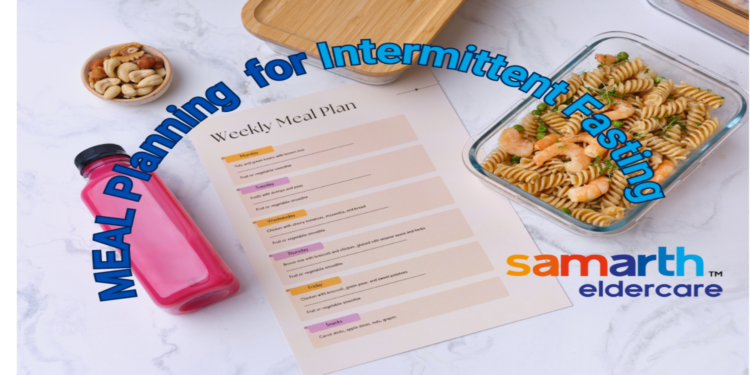We have already seen the many ways one can go about intermittent fasting and the one that suits seniors the most. It is relatively safe with incredible health benefits, even for healthy seniors. Ideally, the 16:8 pattern is the one that seems most suited for seniors. And many timing options exist for one to pick from based on convenience, medications, and health considerations. Let us look at a few options and meal plans.
Timing options
In the 16:8 plan, you follow a 16-hour fasting with an 8-hour eating window. Based on your convenience, the options can be:

Join Now >
- 7 a.m. to 3 p.m.
- 9 a.m. to 5 p.m.
- 12 p.m. to 8 p.m.
- 2 p.m. to 10 p.m.
These can be pushed by an hour or so if you prefer to reduce the gap between sleeping and dinner time lesser. Some prefer to skip breakfast and keep eating till bedtime. The latter options work well for such people. The first two options are better for a more balanced three meals through-the-day approach. As mentioned in our previous article, you may want to experiment for a few days to see what works best for you in consultation with your doctor. Once you decide, it is a good practice to set a timer reminder till you get used to the regime. Otherwise, you tend to forget and may eat without realising it.
What can you eat?
The good thing about the 16:8 fasting diet is that you can eat healthily in your 8-hour eating window. Eating three balanced and nutritious meals in the eating window is enough to sustain you through the fasting window. Every meal must be a mixture of the options given below.
Whole grains: Rice, whole wheat, barley, millet, red rice, and oats.
Vegetables: Broccoli, cauliflower, cucumber, spinach, other leafy greens, and sprouts.
Fruits: Apples, bananas, oranges, pears, tomatoes, avocados, and berries.
Proteins: Beans and legumes, meat, poultry, fatty fish, seafood, eggs, nuts, and seeds.
Healthy fats: Olive or coconut oil.
Eating fermented foods along with these is good. Therefore, for Indians, there is not much of a change needed in their regular meal plan. The breakfast can be idly, dosa, bread, upma, etc., with a dash of veggies and a cup of coffee or tea. Remember that idly and dosa count among fermented foods. Lunch can again be a mixture of rice or rotis with beans and legumes, salads, and a bowl of curd. Dinner can be a mix of grains and veggies. Plan the meals so that you eat different varieties for all three meals. Use herbs and spices for seasoning with less salt. If you snack between meals, only eat fruits, nuts, and seeds.
Avoid sugary drinks, processed and fried foods, packaged snacks, and frozen meals. Hydrate yourself with water and unsweetened beverages through the eating and fasting window. Lemon water and unsweetened coffee or tea are safe beverages for fasting duration. A dash of milk in tea and coffee will not spoil the fasting benefits. Ideally, it is good to avoid milk during the fasting window. Avoid fruit juices and coconut water in fasting the window, as it negates the benefits. Also, avoid alcohol.
Plan ahead
It might be a good idea to plan for the week as to what you will have for the three meals to ensure healthy intermittent fasting. When you rely on unplanned meals, most often, it tends to be unhealthy or not nutritious. Balance the whole grains, legumes, and beans for breakfast, lunch, and dinner. Purchase a healthy mix of vegetables and fruits to eat as snacks and maintain good gut health. These options have good fibre that builds gut health. Instead of going for frozen or processed meals for unplanned meals, you can eat curd rice with fresh salads for healthier options. Or eat a bowl of mixed fruits topped with nuts and seeds to replace the meal. Include some soups and broths in the diet plan.
Ideal meal plan
- Break your fast with a light meal such as fresh, seasonal fruits, semi-cooked veggies, or soaked nuts and dry fruits.
- After half an hour, you can have a light breakfast that includes idly, dosa, upma, poha, oats, etc. Add in some sprouts and eggs to make it nutritious. Remember that idly and dosa can be made with different grains and millets.
- Have a mid-morning snack of fruits, veggie salads, curd, etc.
- Use a combination of rice, rotis, veggies, legumes, millets, and probiotics for a hefty and balanced lunch.
- A healthy evening snack can include makhana, homemade snacks, milk, etc.
- Dinner must be low-carb, high-protein, and high-fibre. Grains, veggies, eggs, chicken, etc.
- Try herbal teas, such as chamomile, cinnamon, ginger, etc., for beverages in the fasting window before bedtime.
- Have a light walk in the evening.









